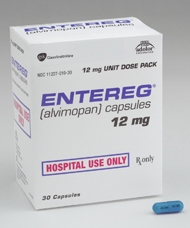Product
Entereg
Approval Date
May 20, 2008
Release Date
June 2008
Companies
Adalor Corporation and GlaxoSmithKline
Class
Peripherally acting mu-opioid receptor (PAM-OR) antagonist
Indication
Management of Postoperative ileus (POI)
Agency Roster
Euro RSCG Life Catapult (Medical Education)
Marketing Strategy/Execution
Adolor/GlaxoSmithKline’s Entereg finally received approval for post-operative ileus (POI), but safety concerns have put a more lucrative potential indication, opioid-induced bowel dysfunction (OBD), out of reach. That means product specialists must promote Entereg within the narrower framework of POI, for which Entereg is a first-in-class drug. Entereg has been approved with a risk evaluation and mitigation strategy (REMS), meaning it can only be prescribed to in-patients at certified hospitals, and just for short-term use. As far as OBD, the FDA has not lifted its clinical hold on Entereg, due to various adverse events seen in trials. These same events have cost GSK and Adolor two approvable letters on Entereg for OBD. That leaves Wyeth/Progenics’ recently approved Relistor, another mu-opioid agonist, in sole possession of the OBD market for the forseeable future.
Also in the Pipeline (according to Adis R&D Insight)
Drug: Relistor
Manufacturer: Progenics Pharmaceuticals, Wyeth
Indication: Postoperative ileus
Active Ingredient: Methylnaltrexone bromide
Phase: III
Source: Wolters Kluwer Health
Recent MM&M Coverage
Product News
Companynews from the 12/19/06 news brief
FDA extends Entereg review period
GSK highlights pipeline products
Pharmacology
Postoperative ileus, the impairment of normal GI motility followingsurgery, has several contributing factors, including the use ofmorphine and other mu-opioid receptor agonists, inhibitory sympatheticinput, the release of endogenous opioids, as well as an inflammatorycomponent. Following surgery, abdominal pain, distention, bloating,nausea, vomiting, and gas and fluid accumulation in the GI tract maydelay recovery and can last =6 days, possibly resulting in longerhospital stays. Alvimopan is a peripherally-acting mu-opioid receptorblocker that antagonizes the effects of opioids on GI motility andsecretion without affecting the analgesic effects of mu-opioid agonistssuch as morphine.
Clinical Trials
Five placebo-controlled trials were conducted to evaluate the efficacyof alvimopan in the management of postoperative ileus. Patients =18yrsold undergoing partial large or small bowel resection with anastomosisor total abdominal hysterectomy under general anesthesia were randomlyassigned to receive alvimopan or placebo. In these 5 studies, 1096patients were randomized to receive alvimopan, and 1081 patients weregiven placebo. Intrathecal and epidural opioids were prohibited, butthere was no limitation placed on the type of general anesthesia used.An accelerated post-op care plan was used: early NG tube removal, earlyambulation, and early diet advancement as tolerated.
Adverse Reactions
Dyspepsia, constipation, flatulence, back pain, urinary retention.
Adults
12mg orally 30min to 5 hours before surgery, then 12mg twice dailystarting on 1st post-op day for up to 7 days or until hospitaldischarge (max 15 doses).
Children
Not recommended.
Contraindications
Opioid use, at therapeutic doses, for >7 consecutive days prior.
Precautions
For hospital use only. Severe hepatic impairment or end stage renaldisease: not recommended. Mild-to-severe renal dysfunction ormild-to-moderate hepatic impairment (monitor; discontinue if adversereactions occur). Recent (within 1 week) use of more than 3 doses ofopioids. Pregnancy (Cat.B). Nursing mothers.









